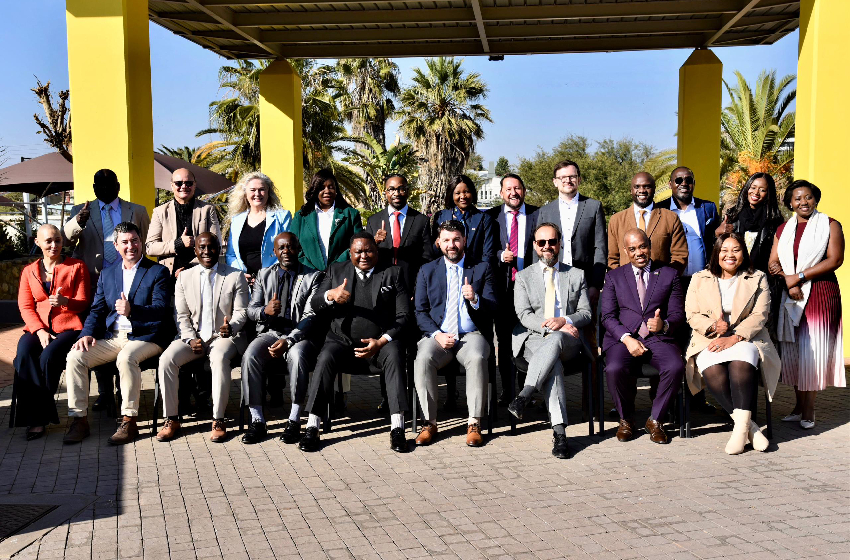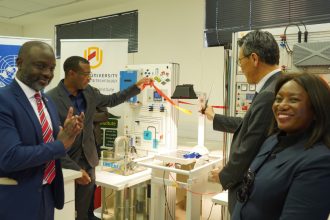The European Union (EU) is supporting the Namibian Training Authority (NTA) and other key stakeholders in implementing a project that will focus on enhancing vocational education and training (TVET), to meet the skills demands of Namibia’s emerging green economy.
The intervention will support curriculum updates, capacity-building for trainers, and the establishment of industry partnerships to ensure that training aligns with labor market needs.
NEW COMPETENCY STANDARDS
This project aims to develop at least five new competency standards related to green energy registered under Namibia’s National Qualifications Framework (NQF). The goal is to revise TVET curricula to align with the green transition and job market needs and to develop a national policy for micro-credentials to offer flexible, industry-relevant training.
The project further foresees the establishment of a National Power-to-X (PtX) Skills Task Force to oversee skills development in hydrogen and renewable energy sectors. At least four Memoranda of Understanding (MoUs) are to be signed between private sector actors and TVET institutions to facilitate industry-aligned training programmes.
Through the project, employment opportunities in renewable energy, hydrogen and energy efficiency will be identified to develop an industry engagement strategy to foster continuous alignment between training programs and labor market demands. The project will conduct a feasibility study on establishing a specialized TVET hub for green hydrogen and renewable energy training.
Project implementers will design structured apprenticeships and on-the-job training programs, targeting at least 100 apprentices in green economy trades.
The NTA project will recommend a framework for the alignment of existing qualifications with the needs of the emerging labour market (with a particular focus on the green energy value chain). It will facilitate the development of qualifications; training programmes; teaching and learning materials; and assessment materials.
The training authority will work towards mainstreaming of gender, entrepreneurship, business skills and transferable skills (21st Century Skills) in training programmes.
ESTABLISHMENT OF TRAINING HUBS
Training hubs will be established in the Karas, Hardap, and Erongo regions, while the scope of the training hub in the north will be expanded in relation to green energy sector.
TVET instructors will be upskilled in modern teaching methods, the use of digital tools, and updated subject matter, while instructors/lecturers on the Renewable Energy and Green Hydrogen sector will also be trained.
The NTA will develop comprehensive teaching materials, including guides, e-learning modules, and case studies, to support instructors, ensuring consistency and impact in training delivery.
Ian Dupont, Chargé d’Affaires of the EU Delegation in Namibia, said Namibia successfully positioned itself as a frontrunner in Green Hydrogen, with several large-scale potential investment projects in the pipeline, representing over €20 billion in projected investment, such as HyIron, Cleanergy, Hyphen, Zhero, HDF, Elof Hanssen, and Daures.
The official said the EU’s support to Namibia was comprehensive: from capacity building and financing to infrastructure, CSO engagement, and skills development.
“We are working together in renewable energy, green industrialisation, and even green maritime corridors. At the heart of this transition lies skills development for Namibians. Identifying skills needs across the green industrialisation and enhancing Namibia’s TVET system are central pillars of our support,” said Dupont.
“We will strengthen the NTA’s coordination role in skills development across the green industrialisation. We want to ensure that resources are used effectively, avoid duplication, and align training programmes with the demands of the labour market,” he said.
GLOBAL LEADER
Namibia’s Green Hydrogen and Derivatives Strategy (2022) provides a clear national vision. It positions Namibia as a global leader, leveraging its renewable energy potential and strategic location to attract investment, create jobs, and boost local manufacturing.
However, this vision depends on a robust vocational training system, led by the NTA under the Ministry of Education.
The PRo-VET project, co-funded by the EU with GIZ, has significantly strengthened the vocational training in Namibia. A flagship achievement was the creation of the Northern Training Hub, comprising the Nakayale, Eenhana, and Valombola Vocational Training Centres. These centres of excellence offer young Namibians access to skills development, especially in sectors like agriculture, construction, and renewable energy. It has boosted employability and supported regional development.
The focus has now shifted to the Southern regions of the country where a new Energy Training Hub is being established.
Dupont said for Namibia to unlock the full economic potential of green industrialisation, a skilled workforce was required. “This project is part of the EU – Namibia partnership that works: a commitment to help young Namibians seize the opportunities in their country. Let’s make it work—together,” said Dupont.






